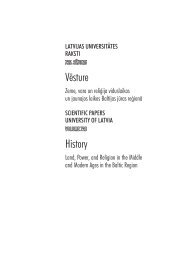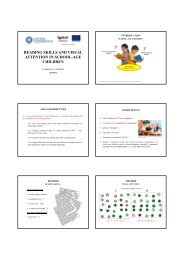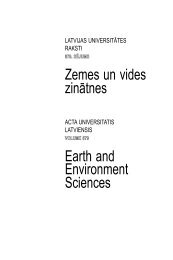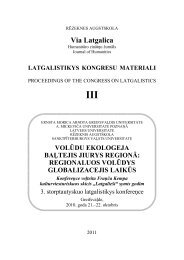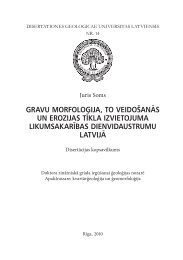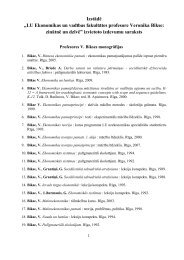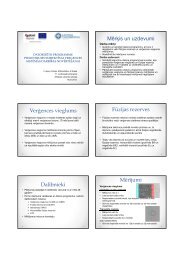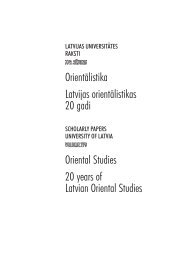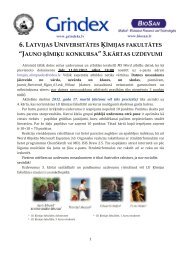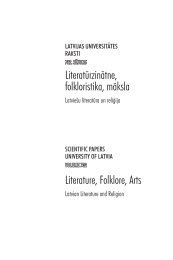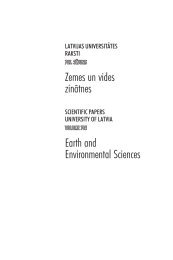Untitled
Untitled
Untitled
Create successful ePaper yourself
Turn your PDF publications into a flip-book with our unique Google optimized e-Paper software.
Aija Poikâne. Vientulîba un ilgas pçc mâjâm afrovâcu rakstnieèu literârajos darbos<br />
cessity to find and build their home in the New World. Blacks created a strong community<br />
and their own culture in the New World in order to fight the “peculiar institution”–slavery.<br />
Creating Black Christianity and producing significant literary narratives,<br />
African Americans “built” home where everybody could be a subject and not an object.<br />
Similarly Afro–Germans, although of course not enslaved, produced their narratives<br />
in order to create their home and claim their rights to home.<br />
Thus, I want to investigate what home means to African Americans and Afro–<br />
Germans and which literary strategies are employed to fight isolation and exclusion<br />
from the participation in the dominant cultures. Additionally I will examine the essay<br />
of Molefi Kete Asante “African Germans and the Problems of Cultural Location”<br />
which is my chief scholarly source. Asante, who is the leading figure in the<br />
Afrocentrism school explains the complexity of the situation of Afro–Germans and<br />
deals with such issues as the myth of blood purity and Afro–German community.<br />
However, before I turn to my comparative analysis I want to explore and understand<br />
the theoretical meaning of home. Therefore, I will examine the issues, presented<br />
in the works by Homi K. Bhabha The Location of Culture and Heidrun Suhr<br />
Ausländerliteratur: Minority Literature in Federal Republic of Germany.<br />
Heidrun Suhr writes: “There are no satisfactory English equivalents for “Heimat”<br />
or “Fremde”. Both terms imply far more than simply “homeland” or “a foreign place”.<br />
“Heimat” also connotes belonging and security, while “Fremde” can refer to isolation<br />
and alienation. This is not simply a problem of translation. Precise definitions of these<br />
terms cannot be given in German either, for their meaning depends to a large degree<br />
on context.” 1 Suhr’s statements beg the question of what is meant by “context” here.<br />
In her work, Suhr analyzes the development of minority literature in the Federal<br />
Republic of Germany, by explaining the context of the history of “Gastarbeiter”<br />
(guest workers). “Gastarbeiter” or guest workers first arrived in 1955 when treaties<br />
for the recruitment of workers were concluded with Italy and later with other South<br />
European and North African countries. The residence of guest workers was considered<br />
to be a temporary phenomena and they were expected to return to their home<br />
countries which means that despite mastering the German language and living in<br />
Germany for about twenty years these people were considered as foreigners. Now<br />
returning back to Suhr’s argument that the meaning of home depends to a large degree<br />
on context, which, of course, proves that home is a social construction, it suggests<br />
that context here is the way white Germans approach racial and ethnic differences.<br />
Thus the notion of home is shaped according to these racial and ethnic categories<br />
which implies that home is a place with certain boundaries. However, these<br />
boundaries may seem unnatural to the members of the second and third generation of<br />
Turkish people or Afro–Germans, for instance, who were born in Germany and speak<br />
German fluently, yet they are not perceived as full members of German society. They<br />
are expected to return home, but there is no home to return to, suggests Suhr.<br />
In contrast with Suhr, who views home as a place to which people are bound in<br />
a sense, Homi K. Bhabha in Location of Culture claims that: “...we find ourselves in<br />
the moment of transit where space and time cross to produce complex figures of difference<br />
and identity, past and present, inside and outside, inclusion and exclusion. For<br />
there is a disorientation, a disturbance of direction, in the “beyond”: an exploratory,<br />
69



